News
Atiku, Ibori, Obaseki Mourn Passing Of Access Bank CEO, Herbert Wigwe

Nigerians was thrown into Mourning when it was reported that MD/CEO of Access Bank Holdings, Dr. Herbert Wigwe was on board with about five others believed to be his wife, son and Abimbola Ogunbanjo, the group chairman of Nigerian Exchange Group Plc (NGX Group), when the helicopter crashed.
Sources said the chopper was headed to Las Vegas when it crashed near a border city between Nevada and California on Friday night.
It was also noticed that Herbert Wigwe and the Lagos State Governor, Babajide Sanwo-Olu, were absent at the Access Bank Lagos Marathon on Saturday.
The governor was represented by his deputy, Obafemi Hamzat.
US officials had said the helicopter crashed near Nipton on the edge of the Mojave Desert late on Friday evening.
Meanwhile, the Edo State Governor, Mr Godwin Obaseki and other well meaning Nigerians have said that they were shocked and devastated over the death of Herbert Wigwe, his family, and Ogunbanjo.
In a press statement by the governor, made available to the journalists on Saturday in Benin, he said, “The news of the passing of the Chief Executive Officer (CEO) of Access Bank Holdings, Dr. Herbert Wigwe, who died in a helicopter crash in the United States of America has left me extremely shocked and devastated.
“We also unfortunately lost Wigwe’s wife and son as well as the former group chairman of Nigeria Stock Exchange, Abimbola Ogunbanjo, in the crash.
“The tragic incident is painful and heart-wrenching and we pray for God’s abiding comfort in this profoundly difficult time.
“Wigwe was a colossus in Nigeria’s financial sector, leading Access Bank to become an international brand that placed Nigeria on the global map of first-class financial services.
“I commiserate with the Wigwe family, the Ogunbanjo family, Access Bank Holding, the Nigeria Stock Exchange, friends, and associates and pray that God will grant all the fortitude to bear the irreparable loss.
Atiku, Ibori Mourn:
Former Vice President and Presidential candidate of the Peoples Democratic Party in the 2023 general elections, Alhaji Atiku Abubakar, has expressed sadness over the death of the Chief Executive Officer of Access Holdings, Herbert Wigwe.
Wigwe, alongside his wife, son and three others were reported to have died in a helicopter crash in the United States of America on Saturday morning (Nigeria time).
The accident also claimed the former group chairman of Nigeria Stock Exchange, Abimbola Ogunbanjo.
Atiku in a condolence message on his verified Instagram handle on Saturday night described the incident as a great loss.
According to him, “I’m deeply saddened to hear about the unfortunate incident that led to the loss of Herbert Wigwe, Group Chief Executive Officer of Access Holdings Plc, and his family.
“Indeed, Herbert Wigwe, consummate banker, education promoter, and philanthropist, numbered his days. On behalf of my family, my heart goes out to their loved ones and everyone affected by this unfortunate incident. May their souls rest in peace.”
On his part, a former governor of Delta State, Chief James Ibori, also described the accident as a tragedy while commiserating with the families of the deceased.
Ibori wrote on his verified Instagram handle, “Noooooooooooooooo Herbert! What a tragedy! Chizoba(Ibo), Herbert, true soul mates even in death!! Rest well comrades! Rest well!!”
Meanwhile, Edo state governor, Mr. Godwin Obaseki, who said he was devastated by the death of the banker, described the helicopter as a high regrettable crash.
Obaseki in a statement said, “The news of the passing of the Chief Executive Officer (CEO) of Access Bank Holdings, Dr. Herbert Wigwe, who died in a helicopter crash in the United States of America has left me extremely shocked and devastated.
“We also unfortunately lost Wigwe’s wife and son as well as the former group chairman of Nigeria Stock Exchange, Abimbola Ogunbanjo, in the crash.
“The tragic incident is painful and heart wrenching and we pray for God’s abiding comfort in this profoundly difficult time.
“Wigwe was a colossus in Nigeria’s financial sector, leading Access Bank to become an international brand that placed Nigeria on the global map of first class financial services.
“I commiserate with the Wigwe family, the Ogunbanjo family, Access Bank Holding, the Nigeria Stock Exchange, friends and associates and pray that God will grant all the fortitude to bear the irreparable loss.”
News
SAD! We are worried if they will ever see – Mums of babies born blind
The pain of birthing babies with blindness is a burden on parents, particularly mothers. Wanting to know the mistakes made and seeking treatment options are the journeys they embark on. JANET OGUNDEPO writes on the stigma, challenges and hopes these mothers face in seeking care for their children
After 14 years of being childless, a Benue-born Fashion designer, identified only as Mary, finally held her bundle of joy.
The years before her daughter’s birth were filled with questions left unanswered, the secret tears that dribbled unbidden down her face as she lay on the bed with her husband at night.
Thankful for a supportive husband, Mary weathered the storms of her childlessness and welcomed the joy of her new baby with gusto.
However, three months after her daughter, whom she named God’s Time, was born, the 32-year-old noticed an unusual colour in her eyes.
“I noticed that her eyeballs were getting bigger but I reassured myself that one of her aunties also has big eyeballs,” Mary told PUNCH Healthwise.
She would later be told by an ophthalmologist that her child’s condition was congenital glaucoma.
“Aside from that, I notice that she avoids looking at the light in the room and bends her head inside the wrapper whenever I put her on my back and we go out. Also, I noticed that the black part of her eyes was looking gray, so I told my husband and pastor about my observation and we were advised to go to Federal Medical Centre, Abeokuta,” she added.
From there, she was referred to another tertiary hospital, this time one of the renowned teaching hospitals in Lagos.
There, God’s Time was diagnosed with congenital glaucoma and was scheduled for surgery to reduce the pressure on her eyes. The procedure would also ensure that God’s Time had a clearer vision.
Surprisingly, despite Mary’s visit to the hospital, she told PUNCH Healthwise that she was still advised by relatives to apply herbal treatments to her baby’s eyes.
“Some would say I should squeeze a particular leaf and drop the extract into her eyes. I refused. In fact, my husband would never agree that I do such,” God’s Time mother added.
Although thankful that the condition was quickly detected and hopes for perfect vision for her baby, Mary still wonders how the child got the condition.
“No one in mine or her father’s family has glaucoma, so I wonder how it came to be,” she stated.
God’s Time, who would soon celebrate her one-year birthday in grand style, continues to hit her baby milestones and grows.
The names of the parents and children have been changed to protect their identity.
Why a child can be born blind
Congenital glaucoma, cataract, anophthalmos (absence of an eyeball or ocular tissue) and congenital corneal opacity (clouding of the cornea) are conditions present at birth or identified shortly after.
These eye conditions could be hereditary, caused by a genetic disorder, infections and exposure to harmful substances during pregnancy, developmental issues during foetal development and retinopathy of prematurity.
Although there is no data in the country to determine the level of the burden of these conditions in Nigeria, congenital glaucoma and cataract seem to be more of the conditions.
Dr Kareem Musa
In an exclusive interview with PUNCH Healthwise, a Consultant Ophthalmic Surgeon and Paediatric Ophthalmologist at the Lagos University Teaching Hospital, Idi-Araba, Dr Kareem Musa, stated that congenital glaucoma, which is commonly noticed at birth or shortly after birth, is commonly sporadic in occurrence but could be familial/hereditary or due to genetic disorders.
He added that it could also occur as part of maldevelopment of the eye or systemic disorders.
Musa explained that the bulging eyeballs seen in affected children resulted from increased pressure in the eyes, which occurred when the fluid produced inside the eye (aqueous humour) is unable to drain properly through the channels in front of the eyes, leading to an accumulation and continuous build-up of the fluid and increased pressure and overtime made the eye pressure very high and, leading to eye damage.
The ophthalmologist stated that the increased pressure affects the optic nerve, noting that since the nerve does not usually regenerate, it leads to irreversible blindness.
Cataract discovered at three months
When 18-month-old Chidera, was three months, his mother, Mrs Effiong, noticed for the first time, a cloudy film covering his eyes.
She discovered that the black part of his eyes, the pupils, were covered with a milky film.
The 35-year-old said she had seen adults with such a condition but never believed a newborn could have such.
In her quest for answers, Effiong visited a private hospital and was referred to a tertiary hospital for specialist care.
“Those around me told me it was a spiritual attack and it was asked to go to church, I was also asked to do the traditional part. I went to the village and did some things but I am not going to talk about it,” she told our correspondent.
After returning from the village, Effiong returned to the hospital for continuous care of her child.
“He was booked for surgery in July last year, but we couldn’t come because I had a little attack and had to stay away,” the Point of Sales Operator and Hairstylist said.
After her recovery, another surgery session was booked in December, sadly, she lost her father and had to return to the village for the burial rites.
The mother of one stated that she refused to give up on orthodox treatment and had already paid for the surgery to remove the cataract from her son’s eyes.
Sadly, Effiong who lives and works on the Island in Lagos, had to close her shop and move to the mainland to stay closer to the hospital so she wouldn’t miss her son’s appointment.
Unarguably, the 35-year-old has put a pause on running her business for her child’s care.
Effiong strongly believes that after the surgery, Chidera will regain his sight, resume school and have a good life.
Lost sight at nine
Though the smiles filled the lips of a 34-year-old mother of two, Mrs Lawal, the pain in her voice as she expressed her worries over what could have caused her son’s congenital glaucoma rang through.
Vision in her nine year old, Tunde, has been completely affected and reduced to a bare perception of objects and people.
A late discovery and presentation is responsible for Tunde’s worsened eyesight.
But the fault was neither his nor his parents as Lawal stated that he was given birth to in a private hospital and they were unaware of an anomaly with his eyes.
Going down memory lane, she said, “It was discovered when he was three years old. That day, his grandmother carried him on her back to the market, and he began to cry when the sun hit his face. His grandmother thought he was tired of being backed and put him down. When he was on his feet, the seller who was selling something to her saw how he was avoiding the sun and asked the grandma what was wrong.
“She then told her to take the child to a General Hospital in Lagos and she wrote down the phone number of someone to call. It was at the doctor’s visit that we were told he had congenital glaucoma.”
After the diagnosis was made, Tunde underwent surgery to relieve the pressure in his right eye.
Sadly, by that time, vision had worsened in the left eye, therefore, no surgery was done.
The nine-year-old was placed on eye drops, which his mother dutifully applied every morning and night, regardless of the cost.
To ensure he lived an independent life and continued schooling, Tunde has now been sent to one of the Schools of the Blind, where he continues to thrive.
Although sad about her son’s situation, Lawal urged parents to be observant about their children’s eyes and visual behaviour, adding that they should visit a registered hospital for any concerns they had.
Subtle signs of eye problems in a baby
The paediatric ophthalmic surgeon highlighted signs of congenital defects and eye problems in infants as teary eyes, avoiding looking at the light, lack of response to light rays directed in the eyes, bulging eyeballs, cloudy or hazy film on the cornea and grayish colour of the pupils.
Dr Ismail Lawal
Also, a Consultant Ophthalmologist at the Federal Teaching Hospital, Birnin-Kebbi, Kebbi State, Dr Ismail Lawal mentioned, “If you’re breastfeeding a child and the child is not looking at your face, at three months, you know that there’s a problem because children will usually look at their mother’s face.
“If you’re giving the child a toy and the child is not interested; when you turn on the light in the house and the child closes the eyes; the child’s eye is tearing every time, these are not normal things. You need to quickly go to the hospital.”
Premature babies at increased risk
Although any child could be born with congenital blindness, the paediatric ophthalmic surgeon at LUTH, Dr Musa, stated that premature babies were at increased risk of congenital blindness referred to as retinopathy of prematurity (ROP).
A study conducted by Prof Dupe Ademola-Poopola, Dr Kareem Musa et al, titled, “Case Series of Retinopathy of Prematurity Blindness in Nigeria: A Wakeup Call to Policy Makers, Hospitals, Ophthalmologists and Paediatricians” discovered that inadequate ROP screening coverage portends a high risk for increasing cases of ROP blindness
The study findings showed that “About 90 per cent of the babies who became blind did not undergo ROP screening. It is crucial that all babies born at 34 weeks or earlier and have birth weight of less than1500 grams in public/private hospitals be screened for ROP to prevent this avoidable blindness in Nigeria.”
Why preterm babies are at risk
Speaking further with PUNCH Healthwise, Musa noted that there has been an increase in cases of retinopathy of prematurity (ROP), which if not quickly detected and continues unabated, could lead to retinal detachment and blindness.
He advocated a compulsory screening for retinopathy of prematurity in pre-term (premature) babies to ensure early detection and screening.
“What is done is, the moment you identify a preterm that fits into the criteria, three to four weeks after birth, we start the screening. We start looking at the back of the eye. Is there ROP or not? If there is no ROP, you see them every two weeks.
“If there is ROP, you decide, is it the one that we have to treat immediately? Is it the one that we just monitor and see whether nature is going to take its course? If it’s the one that we have to treat immediately, that’s the one that, if you don’t do anything, it’s an emergency, that’s the one that can lead to blindness.
“The moment the retina detaches due to ROP, yes, surgery can be done. The surgery is more difficult and expensive and in terms of prognosis/the likelihood for good vision, the guarantee is less. So, it is better for the ROP not to get to that stage.
“So we are seeing more of those cases now and the reason is because, in terms of the quality, the availability of equipment and expertise for neonatal care is much better. So more of these preterm babies are surviving compared to before when they don’t live long enough to detect those conditions,” the ophthalmic surgeon said.
Congenital blindness not death sentence – Ophthalmologist
Speaking further on the risk factors, Musa further noted that the consumption of herbal medications especially concoctions whose constituents are unknown and unprescribed orthodox medications, during the first trimester of pregnancy, could affect the development of the eyes or parts of the body.
“There are different types of glaucoma. But the common denominator, what we call the optic nerve, is actually getting damaged. And when it gets damaged, because it’s a nerve, it doesn’t usually regenerate. So all over the world, glaucoma is the commonest cause of irreversible loss of vision,” the paediatric eye doctor said.
He further noted that while congenital glaucoma is not a death sentence, blindness resulting from congenital glaucoma could predispose the child to delayed developmental milestones and life-threatening conditions like falls with head injury.
The Associate Professor of Ophthalmology at the College of Medicine, University of Lagos, Idi-Araba, further noted that aside from congential glaucoma, babies could also be born with congenital cataract, anophthalmos (absence of an eyeball or ocular tissue) and congenital corneal opacity (clouding of the cornea), among others.
Avoid prolonged labour
The associate professor stressed the need for pregnant mothers to avoid prolonged delivery, stating that it can make the brain suffer long periods without oxygen, leading to cerebral palsy and cerebral visual impairment if it affects the part of the brain in charge of vision.
He also said that children who develop meningitis could have their vision affected.
Musa urged pregnant women to deliver their babies in registered health facilities and under the care of skilled birth attendants, emphasising that the quality of personnel and care received during delivery, contribute to the early detection and treatment of these blinding ocular conditions.
He further noted that the economic status of many parents prevented them from accessing care despite early presentation, adding that some of them no longer returned after getting a diagnosis.
The don urged the government to intervene in ensuring eye care, especially for children, was affordable.
Musa assured parents that congenital blindness was not a death sentence, however, stating that children with cataracts needed immediate care to ensure their vision was restored.
“When you remove the cataracts, their vision comes back. In children, anything that affects their vision, the longer it takes for you to get it sorted out, the likelihood that they will develop a condition called Amblyopia as an added problem is high.
“What do I mean by that? If an adult has cataracts, the moment you do the surgery, vision is going to come back. So, if a child is born with cataracts and does not present early, the longer it stays there without intervention, the likelihood that they will develop Amblyopia is high. This means that after the surgery and light can get to the back of the eyes and glasses is given, you expect the eye to see, but vision does not improve because the child has developed Amblyopia.
“So you now need to start treating that Amblyopia and the longer it takes for you to intervene, you may not even be lucky with the reversal.”
He urged parents not to dismiss their children’s eye complaints and present early to the hospital when there was noticeable observations in the eyes.
Musa also corrected the notion that childhood blindness is caused by a spiritual attack, noting that the risk factors for the conditions are known and are medically explainable.
The ophthalmologist warned parents against harmful traditional practices and encouraged them to bring their children to the hospital whenever they discovered problems with their eyes.
Many believe a child can’t be blind – ophthalmologist
Speaking further, the FMC Kebbi ophthalmologist, Lawal, stated that only a few people realised and understood that babies could be born with blindness.
He noted that the lack of awareness about the conditions prevented many, even some health practitioners, from examining the eyes and vision of newborns while checking other sense organs.
Lawal said, “Many believe that a newborn can’t see at that age and that it will take some time to be able to assess their vision and things like that. There are even situations where parents go to health workers and complain that they think their child’s eye has issues and the health worker will just dismiss it and say, no, don’t worry, the child is still a baby, the child will grow it. By that time, it’s becoming too late for anybody to intervene and do anything.”
He further noted that some congenital blindness, such as cataracts and malformation of the eyelids, could be reversed following assessment by an ophthalmologist and immediate intervention.
The ophthalmologist also stated that a greater extent of congenital glaucoma, congenital nerve damage congenital dystrophy of the retina was most of the time irreversible.
Lawal, who is also the Nigerian Medical Association Chairman for Kebbi State, emphasised the need for immediate rehabilitation of children with irreversible blindness to ensure they acquire functional skills.
Most cases treatable in tertiary hospitals
The eye expert also said that most cases of reversible congenital blindness in the country were treatable, especially when presented early.
He further noted that the lack of awareness about the conditions and knowledge about the appropriate health facility were factors limiting access to care in the country.
The ophthalmologist added that the financial status of the parents and caregivers to afford the treatment options also contributed to delayed care and treatment.
Lawal advocated active health insurance coverage for citizens to ensure easy access to eye care services.
He added, “The major problem we have is inadequate manpower. And that has to do essentially with the poor remuneration of health workers. If the health workers are appropriately paid, it may encourage many of them to stay back and that can improve their availability. For the few that are available, it will be difficult for them to abandon their clinic and go about on sensitisation tours.
“But I can tell you that the Ophthalmological Society of Nigeria, Optometrist Association of Nigeria and the National Association of Ophthalmic Nurses are doing a whole lot in terms of advocacy and awareness campaigns, especially when it comes to World Health Days. On World Sight Day and World Glaucoma Week, they carry out a whole lot of jingles. It’s a whole lot that is being done and still needs a whole lot.”
The Kebbi State NMA chair called for collaboration between the government, non-governmental organisations, individuals, civil society groups, the media and health workers to increase public awareness and education about health-related information to the public.
“So that people can be aware and know where to go and seek help when they notice one or two things abnormal about the child,” the eye doctor added.
News
Liquidation: Heritage Bank depositors to receive first tranche of dividends in April

Depositors at the defunct Heritage Bank with balances exceeding the N5 million insurance cap are set to begin receiving partial refunds in April, according to the Nigeria Deposit Insurance Corporation (NDIC).
The development follows months of uncertainty for customers who held significant balances at the lender before its abrupt closure.
The Central Bank of Nigeria (CBN) revoked Heritage Bank’s banking licence on 3 June 2024, citing concerns about the bank’s financial condition. The NDIC was appointed as liquidator in line with Section 12(2) of the Banks and Other Financial Institutions Act (BOFIA) 2020 and Section 55(1 & 2) of the NDIC Act 2023.
In a Sunday statement signed by its Acting Head of Communication and Public Affairs, Hawwau Gambo, the NDIC confirmed that it had made progress in recovering the bank’s assets and would begin the first tranche of liquidation dividends next month.
“With the considerable progress recorded in the asset realisation, the Corporation will declare the first tranche of liquidation dividends in April 2025, which will be paid to uninsured depositors on a pro-rata basis, in line with Section 72 of the NDIC Act 2023 on the priority of claims,” the statement said.
While depositors with balances below N5 million have already been reimbursed, those with higher amounts have only received the insured portion to date.
“The remaining balance in excess of the insured sum of the N5 million already reimbursed will be paid as liquidation dividends in accordance with the Corporation’s statutory mandate,” the NDIC said.
The corporation said it had commenced the realisation of Heritage Bank’s physical and investment assets, alongside an “aggressive recovery of the risk assets,” in order to fund repayments.
“Following the revocation of Heritage Bank’s banking licence… the Corporation immediately commenced the bank’s liquidation process, including the verification and payment of insured deposits to all depositors,” the statement said.
However, it acknowledged challenges in reaching some insured depositors due to incomplete Know Your Customer (KYC) information, post-no-debit restrictions, name mismatches, or lack of alternate bank accounts.
“Some payments may have been processed without their immediate awareness,” the NDIC added, urging depositors to check other bank accounts they may hold.
liabilities take precedence in bank liquidation. The NDIC reiterated this, citing Section 72 of its Act: “Deposit liabilities shall have priority over all other liabilities of the insured institution.” As a result, other claimants—such as creditors and shareholders—will be considered for payment only after all depositors have been fully reimbursed.
Tinubu birthday
The corporation sought to reassure the public about the safety of Nigeria’s banking sector. “Members of the public are enjoined to continue their banking activities without fear, as all other banks remain safe and sound,” the statement said.
News
N24bn monthly salaries drive Oyo’s economic stability – Makinde assures
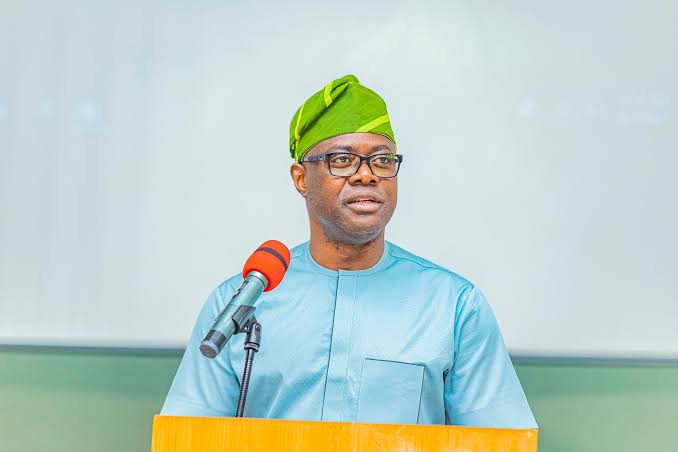
Oyo State Governor, Seyi Makinde, said his administration has ensured economic stability in the state through the monthly payment of about N24 billion in salaries to state and local government workers.
Makinde made this known on Sunday when a delegation of Muslim clerics, traditional rulers, and political officeholders visited his Ikolaba, Ibadan, residence after the Eid-el-Fitri prayers at the Agodi Eid Ground.
According to a statement by his media adviser, Sulaimon Olanrewaju, the governor said his government’s commitment to economic expansion had attracted private sector investments to the state.
The governor said, “My prayer has always been that this state will never go back to those periods, because if we have patience, all the things we want will be achieved.
“One of those things we desire is economic stability in our state. Now, every four weeks, N24 billion gets into the economy of Oyo State through workers’ salaries. The wage bill of the state is now around N14 billion, while that of the local government is about N10 billion.
“Similarly, on the private sector side, a lot of people are now comfortable coming and investing in this state, and we have seen quite a lot of investments.
Yesterday, we were at the Ijaiye Farm Settlement because of the Farmers’ Wholesale Market that is coming in there. I went there to inspect the place, and you will be surprised that in that settlement, we have 27,000 hectares of land. We have asked them to carve out just 3,000 hectares out of the 27,000 for that project.”
He urged residents to sustain the peace and unity in the state, noting that development thrives in a stable environment.
He stated, “Let me also use the opportunity to say one or two things. When we cast our minds back to 2007, a lot of things have happened since then. We can all see here how our people from different political parties went for the prayer at the Eid Ground, and everyone came together and came to greet me as the governor.
“We used to have the opposite of this in this state back then. You would hear people say before Eid that this one should not come and that one should not come.
“We passed through those periods and we saw the result and effects and we can compare them with what is obtained now. When we have an atmosphere of unity and live in peace with ourselves, there will be development and progress. That is what we are witnessing in the state today.”
The delegation was led by the Deputy Governor, Bayo Lawal, and included the Otun Olubadan of Ibadanland, Oba Rashidi Ladoja, Senator representing Oyo South, Chief Sharafadeen Alli, former Deputy Governor and the Peoples Democratic Party Deputy National Chairman, Taofeek Arapaja, and Kamil Oloso, among others.
The governor congratulated the Muslim Ummah on witnessing the end of Ramadan and the Eid-el-Fitri 2025.
He lauded them for their prayers, patriotism and commitment to the state as well as their support for his government, noting that the economic stability and developments being witnessed in the state were a result of the peace and harmonious coexistence among residents of the state.
Makinde urged all residents to work hard to sustain the atmosphere, adding that every good thing they desire for the state is tied to the existence of peace and harmony in the state.
“Let me also say this: political office holders across the country should do their best to improve things because it has been a difficult and challenging period for the people, but as they say, tough times don’t last, only tough people do,” he added.
Delivering the message of the Olubadan of Ibadanland, Oba Owolabi Olakulehin, the Otun Olubadan of Ibadanland, Oba Ladoja, called for patience among the people of the state and urged them to remain steadfast and hopeful in the face of challenges.
-

 News20 hours ago
News20 hours agoPetrol prices rise nationwide as MRS, other atations hike rates
-
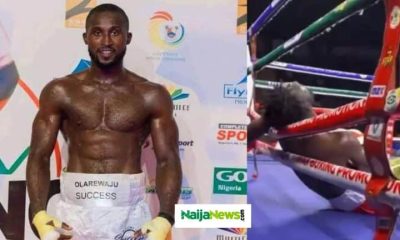
 News20 hours ago
News20 hours agoPAINFUL! Nigerian Boxing Sensation Olanrewaju Dies in Ghana After Slumping During Fight
-
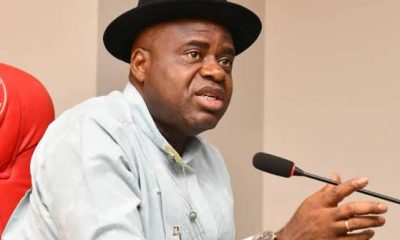
 News14 hours ago
News14 hours agoWATCH Gov Diri’s Tech Adviser, Kerry admits blowing up pipelines
-

 News17 hours ago
News17 hours ago“How I threatened to fire Wike over TSA exemption but I’m happy with him”-Tinubu
-
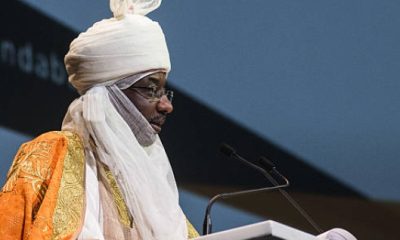
 News20 hours ago
News20 hours agoEdo killings: Sanusi warns Kano youths against vengeful attack
-

 News6 hours ago
News6 hours agoUpdated: WATCH moment Gov Diri’s Tech Adviser Kerry admits blowing up pipelines (Video)
-
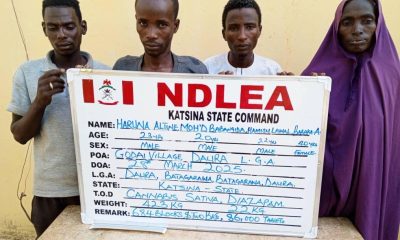
 News24 hours ago
News24 hours agoLekki, Italy based businessmen nabbed over illicit drug shipments to Nigeria, Europe(PHOTOS)
-

 Entertainment16 hours ago
Entertainment16 hours agoEdo Assembly member, Natasha Updates Social Media with Fiancé’s Surname, Idibia





